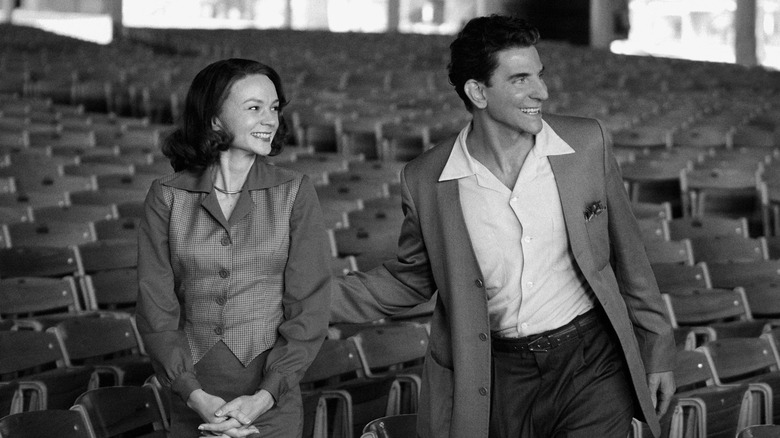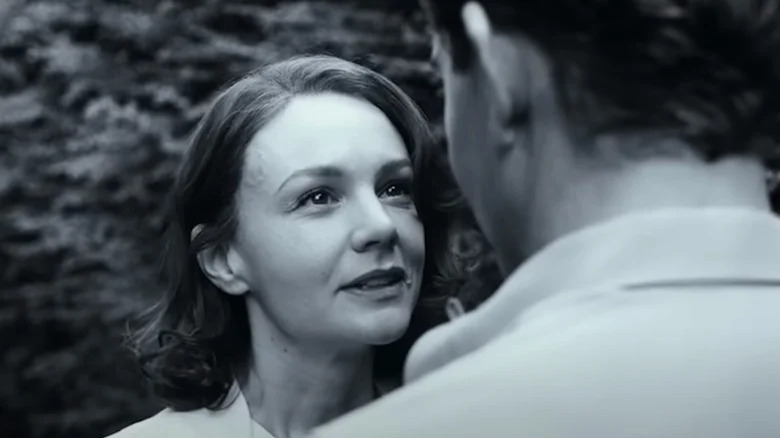Maestro Review: Bradley Cooper Delivers The Sights And Sounds, But The Story Is Lackluster [LFF 2023]
"Maestro" continues Bradley Cooper's rise as a director to watch, particularly one for music-centric stories, capturing both the auditory and visual spectacle of the stage with ease. While this is clearly a personal story Cooper was keen to tell — obsessively convincing Speilberg not only to give away the project but also sign on as a producer — the end result is a disappointingly tame tale of the first great American composer, a movie that plays like a traditional awards season biopic complete with a focus on a doomed marriage. While this ends up being the emotional core of the film, the story of Leonard Bernstein and his wife Felicia Montealegre treads overly familiar grounds, and it doesn't help that Carey Mulligan is miscast in the role of a Latina actress.
There are moments of greatness, however, particularly when it comes to Cooper's visual eye. The story tells the rise of Leonard Bernstein as a conductor and composer from the serendipitous day he got asked last-minute to lead the New York Philharmonic orchestra all the way through his tumultuous marriage with Montealegre until her death in 1978. Cooper, who already showed great promise as a director with a clear vision for composition in "A Star is Born," presents a significant chunk of the movie, which starts in the '40s, in era-appropriate black and white and a 4:3 aspect ratio. More than a gimmick, this helps give the film an alluring style that uses light and shadow to exude the passion Bernstein feels both for music and for people, both men and women.
Let Bradley Cooper direct a musical
In an early highlight of the film, we follow Bernstein as he gets out of bed and waltzs around Carnegie Hall the day he gets the phone call that kickstarts his career. Cinematographer Matthew Libatique creates a masterful tracking shot of Bernstein that heads from Bernstein's bedside to the stage itself as if it were just in his living room, showing how close the conductor was to his work.
Proving that Cooper should just go ahead and direct a musical, there is also a spectacular musical number once Bernstein falls for actress Felicia Montealegre, which shows an early version of Bernstein's sailor ballet "Fancy Free" (which would eventually become "On the Town") that shows Cooper's ability to weave sound with great performances. Once the film jumps forward to the '50s and '60s, the old Hollywood aesthetic is replaced with bright colors while keeping the square aspect ratio that is juxtaposed with the more chaotic moments in the conductor's life with great effect. A scene of an older Bernstein leading a massive orchestra inside a cathedral, his joy upon feeling the impact of his work while knowing his private life is falling apart, is particularly effective.
Because the film is more about the Bernsteins than it is about the music, the struggle of Leonard's homosexuality and multiple affairs taking a toll on his marriage while his music constantly pulls him apart serving as the emotional crux of the film. Cooper is fantastic at recreating Bernstein's mannerisms and speech, but after a while, it feels like a copy rather than an interpretation. Sure, part of the film is that Bernstein led such a constructed public life that few truly knew him, but "Maestro" doesn't communicate that very well through Cooper's performance.
The curious case of Carey Mulligan
While a lot has been said about Cooper using a prosthetic nose to play the Jewish Bernstein, the same cannot be said about white English actress Carey Mulligan playing the Costa Rican Montealegre. Mulligan's performance relies heavily on her character calling back old sayings from her homeland, as well as don an accent, which is a disservice to the real person Mulligan is playing. That the real Felicia was not just born in Latin America but raised there and she never let go of her roots makes the film's portrayal of her rather offensive.
While Mulligan plays the character of the silent companion who absorbs and parries everything her problematic partner throws at the world, reacting more than acting, rather well, it still ends up being little more than just "the wife role." Indeed, not that "Maestro" had to devote much time away from the music, but the real Montealegre was deeply engaged in activism and politics, hosting an evening for the Black Panther Party that landed the Bernsteins on the FBI's sights, and also co-founding the antiwar organization "Another Mother for Peace" which led to her arrest at a protest in 1972. The movie's version of Montealegre gets the heavier emotional moments, sure, but they play out as forced and manipulative, missing nuance.
"Maestro" may present exhilarating moments of musical performances, but unlike the story's subject, it is a rather forgettable experience. Still, Cooper continues to show promise as a director, even if the script he co-wrote with Josh Singer is not up to par.
/Film Rating: 7 out of 10


